Icilma
In 1895, Stephen Armitage [1855-1912], an English civil engineer from Barlow, Derbyshire, was made the new director of the Société Générale des Pétroles Franco-Algériens, Ltd., a company formed in 1893 to acquire oil rights, concessions and/or franchises in Algeria. When drilling for oil at Hammam Selama, 5 km south of Port-aux-Poules, Armitage discovered an artesian source of hot mineral water.

Above: Water flowing from the artesian bore near Port-aux-Poules.
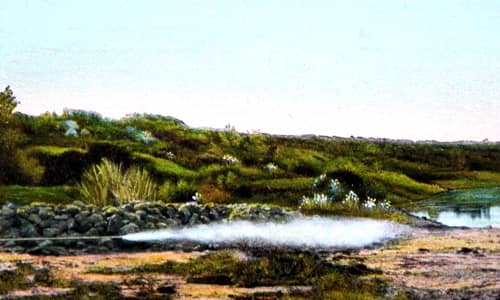
Above: Safety valve in operation. The Selama mineral water was hot and under considerable pressure.
A hot water spring was of little use to a petroleum company but Armitage decided to capitalise on it by using the hot mineral water to operate a thermal spa similar to others already operating in Algeria at Hammam Bou-Hadjar and Bou-Hanifia. He cased the borehole and channelled the water to bathtubs he installed in 1896.
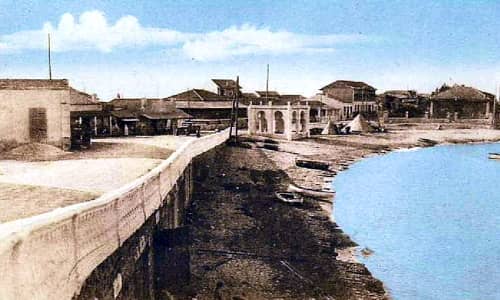
Above: c.1920 Fountain and beach at Port-aux-Poules, Algeria.
Armitage considered opening a hotel at the site but elected instead to sell bottled water from the bore along with a range of products made with it. Algeria was a French colony and this may have been why Armitage elected to situate his factory at Asnières-sur-Seine, Paris. In 1899, he also opened a retail outlet, the Maison Icilma, at 5 Avenue de l’Opéra, Paris.
Above: 1899 Icilma Water. A marvellous water for wrinkles. Armitage apparently derived the Icilma name from two Arabic words ‘icil’ meaning flows and ‘mha’ meaning water.
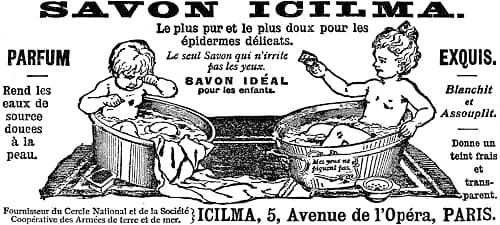
Above: 1900 Savon Icilma (Paris).
The Paris outlet was not successful and Armitage decided to move the base of his operations to Britain. Icilma products had been on sale in Britain from 1900 at the latest through the agents Barclay & Sons Ltd. The Icilma brand had also been trademarked in Britain in 1898 and Armitage followed this with two other trademarks, ‘Selama’ and ‘Amel’. Selama was a reference to the origins of the water, Amel was apparently derived from the Arabic word for hope.
After moving from Paris to 142 Gray’s Inn Road, London in 1901, Armitage formalised his business in Britain by establishing the Icilma Company Ltd. in Guernsey in 1904 with himself as its sole governing director. By 1907, the company was doing so well that it had to relocate to larger quarters at 14a Rosebery Avenue, London. The company moved again in 1911 to premises at 37-41 King’s Road, St Pancras, a site which also included a factory.
To sell its products, Icilma conducted an extensive advertising campaign starting with small advertisements which got larger as the company expanded. Icilma also ran a number of promotional schemes to increase sales. These included: special boxes with samples at a reduced sale price; free massage charts given away with its skin creams; coupons for women who did not possess an Icilma Spray; free postcards of the Icilma spring; and the use of demonstrators going house to house then turning in orders at local stores.
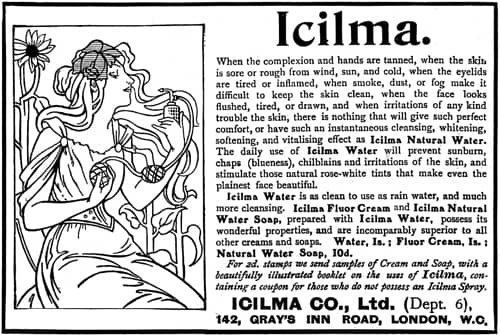
Above: 1904 Icilma Water, Icilma Fluor Cream and Icilma Natural Water Soap with an offer for free samples, a booklet and a coupon for an Icilma Spray.
The promotional campaigns that made Icilma a household name in the years before and after the First World War were probably developed by L. H. H. Swann, an advertising and selling man who joined Icilma in 1905 and later became the company chairman.
Products
When originally founded, Icilma was both a patent medicine and a cosmetic company. Water from the artesian bore was said to cure or ameliorate a variety of illnesses and other problems while the cosmetics helped to beautify the user.
Icilma sold two types of mineral water derived from the artesian source in Algeria – Selama Water and Icilma Water. Selama Water was directly sourced from the artesian bore in Algeria. It could be drunk but Icilma also combined it with witch hazel extracts and other ingredients to make Amel Jelly which was recommended for piles. Icilma Water was an ‘oxygenated’ form of Selama Water to be used topically by itself or with other products.
An analysis of Selama Water published by the Bristol Medico-Chirurgical Journal in 1903 reported that it contained calcium carbonate dissolved by carbon dioxide, magnesium sulphate, calcium sulphate, sodium chloride, and traces of iron and alumina. In 1900, the Lancet reported the presence of silica and Armitage also claimed that it contained sulphur and calcium fluoride.
Selama Water: “[R]ecommended for external application in cases of eczema and internally in doses of about 2 oz. for indigestion, gout and anaemia.“
Icilma Water was claimed to ‘neutralise the injurious effect of lime salts and other organic matter contained in most ordinary water’ and to cure a wide variety of skin complaints including bruises, styes, burns, scratches, chilblains and chapped skin. It could be rubbed or sprayed on the skin but Armitage also used it in a range of cosmetics and toiletries.
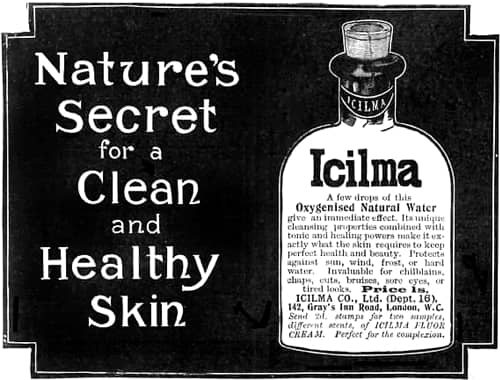
Above: 1905 Icilma. Oxygenated Natural Water.
Icilma Water: “A few drops of this Oxygenised Natural Water give an immediate effect. Its unique cleansing properties combined with tonic and healing powers make it exactly what the skin requires to keep perfect health and beauty. Protects against sun, wind, frost, or hard water. Invaluable for chilblains, cuts, bruises, sore eyes or tired looks.”
Health and beauty products made with Icilma Water included toiletries such as Icilma Soap, Iclima Shaving Sticks, Icilma Shaving Cream, and Icilma Tooth Paste; Icilma Fluor Cream, a vanishing cream named after the calcium fluoride said to be present in the water; Icilmine, a thickened version of Icilma Water; Rosée Icilma, a skin tonic; and Icilrose, a liquid rouge probably coloured with cheaper cathamine rather than the more expensive carmine.
Icilma Soap: “Cleanses admirably, prevents the effects of hard water, sunburn, chilblains, redness, gouty eczema, and irritations, and it silky later is a revelation.”
Icilma Tooth Paste: “[P]repared with Icilma water. It prevents decay in the teeth, facilitates the removal of tartar, and strengthens the gums.”
Fluor Cream: “Deliciously perfumed, without oil or grease, is the only ideal perfect skin food. It is the only cream that cleanses the pores, improves the circulation, helps check the growth of superfluous hairs and leaves the skin healthy and fresh, imparting to it a pearly hue, through which the blue veins are faintly seen.”
Icilrose: “Invaluable for actresses who do not wish to use Grease Paints. … [A]bsolutely defies detection, and is unchanged by Rain, Heat or Dust.”
Icilmine: “[R]ubbed lightly over the the body, and then after a few moments frictioned off in the bath, all fatigue is gone at once, the whole body and skin is full of life. … [I]nvaluable for removing and toning a theatrical make-up.”
Of these products, Fluor Cream was particularly successful and it went on to become one of the best-selling British face creams of the 1920s. Its development may have been assisted by Dr. James Auriol Armitage [1857-1923], Stephen Armitage’s brother, who worked with Icilma concurrently with running his medical practice in Wolverhampton. Descriptions of the cream suggest it was a foamy, vanishing cream possibly similar to Burroughs Wellcome’s Hazeline Snow but formulated without hazeline.
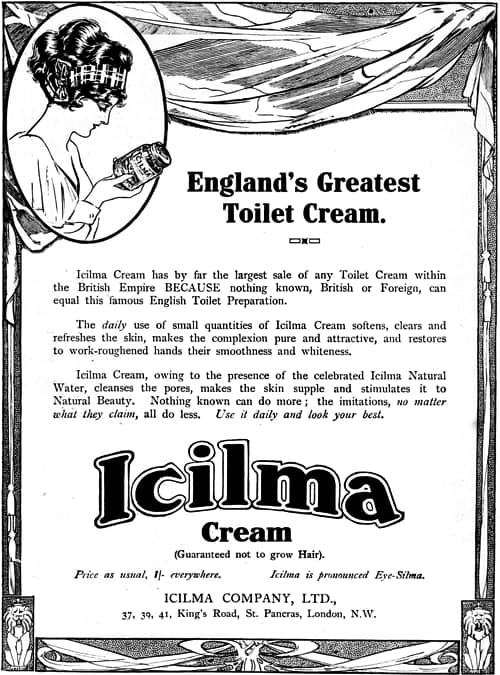
1917 Icilma Cream. ‘Fluor’ has been dropped from the name.
See also: Hazeline Snow and Vanishing Creams
By 1910, Icilma had added a wet and a dry shampoo – Icilma Shampoo Sachets and Icilma Hair Powder – which also proved to be very popular.
Shampoo Sachets: “[N]o rinsing is necessary—the hair can be done up almost immediately—and is left beautifully soft, fresh and glossy.”
Hair Powder: “Just apply a little with powder puff or spray, and brush out, that is all. This removes grease and dust—brightens, cleanses, and beautifies the hair—without wetting, without trouble and without danger.”
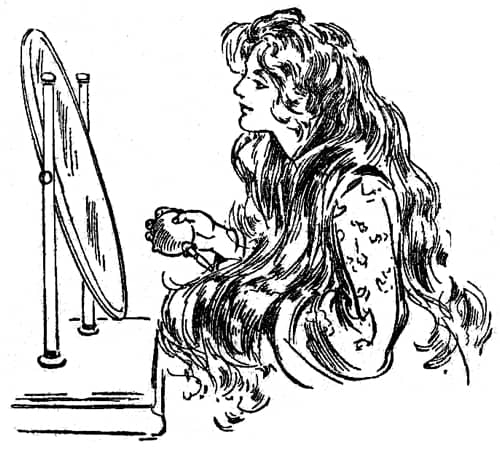
1910 Illustration of a woman spraying Icilma Hair Powder on her hair to clean it.
Death of the founder
In June, 1912, Stephen Armitage died unmarried and without any children. Concerned that the company continue to have the services of L. H. H. Swann after his death, Armitage stipulated in his will that 74 Icilma Company shares were to be kept in trust to pay dividends to L. H. H. Swann for the next six years after which, if he still remained with the company, the shares were his absolutely. Of the remaining Icilma shares, two-eighths went to Stephen Armitage’s brother James, two-eighths to his brother Edward, one-eighth to his friend Thomas Andrew Barber, one-eighth to each his sisters-in-law, Margaret Williamson Berridge and Amy Armitage and one-eighth to Edward Howarth Armitage. Some of these beneficiaries continued to play an active role in the company. In 1914, the directors of Icilma were listed as James Auriol Armitage [1857-1923] (Chairman), Edward Howarth Armitage [1859-1929], Caesar Mendel, and L. H. H. Swann (Managing Director).
The new management team began to move Icilma towards the cosmetic mainstream. In 1913, the company added Icilma Nail Powder Polish to its inventory – a pink coloured paste made with a mild abrasive such as zinc or stannic oxide – and Icilma Flesh-Tinted Cream – a version of Icilma Fluor Cream coloured with Icilrose. The company also began dropping ‘Fluor’ from Icilma Fluor Cream in its advertising even though ‘Fluor’ still appeared on the jar labels.
Icilma Nail Powder: “[G]ive the final touch of elegance to every woman’s toilet.”
Icilma Flesh-Tinted Cream: “A specially prepared form of Icilma Cream with Icilrose added, for giving colour to those who suffer from pallor. It is absolutely unique, and not merely a rouge.”
See also: Nail Powder Polishes
By 1913, the company had also added a cold cream. Icilma Fluor Cream was advertised as ‘greaseless’ and was said to be superior to cold creams which ‘clog the pores’ so Icilma sold its cold cream as a massage cream rather than a toilet cream. This would change later.
NATURE did not invent powder or cold creams that must clog the pores and make irritation more lasting.
(icilma advertisement, 1906)
Icilma Cold Cream: “Specially prepared for massage—it is not a toilet cream.”
By the time the First World War broke out in 1914, Icilma was well established across much of Europe, the British Empire and elsewhere, with depots in Sydney, Wellington, Cape Town, Johannesburg, Toronto, Paris, Brussels, Basle, Cairo, Constantinople, Bucarest, Patras, Smyrna, Barcelona, Copenhagen, and Osaka. In 1919, the strength of this international trade was recognised by the company founding the International Icilma Trading Company as its distribution agent. As far as I can tell there were no manufacturing facilities developed overseas with goods still being manufactured by the Icilma Company in St. Pancras, now at 37-43 King’s Road.
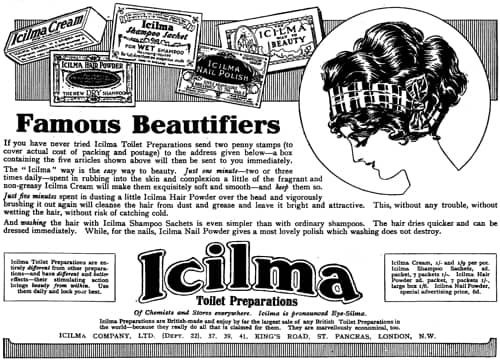
1915 Icilma Cream, Hair Powder, Shampoo Sachet, Nail Polish and the ‘Icilma Way to Beauty’ Booklet.
At some stage after 1913, Icilma added a violet-scented Icilma Poudre de Riz Face Powder in four shades. Then, in 1920, it added Bouquet Face Powder in two shades using the same Bouquet fragrance the company had previously used to scent Icilma (Fluor) Cream. The Bouquet fragrance was said to be compounded with essential oils derived from rose, orange, jasmine, acacia and orchid blossom.
Icilma Poudre de Riz (Violet): “This superfine Toilet powder, perfumed with the costly essence or real Rivera violets cannot be surpassed at any price.” Shades: White, Rose, Rachel and Natural Tint.
Bouquet Face Powder: “[H]elps Icilma Cream to protect the skin from the effects of sun and wind, and leaves the surface smooth and fresh. The Naturelle tint suits most complexions, is practically invisible and entirely supersedes and replaces white or rose powder—the Crème tint is especially for brunettes.” Shades: Naturelle and Crème. Later shades added were Rosée and Brunette (1929) and Sun-Tan (1934).
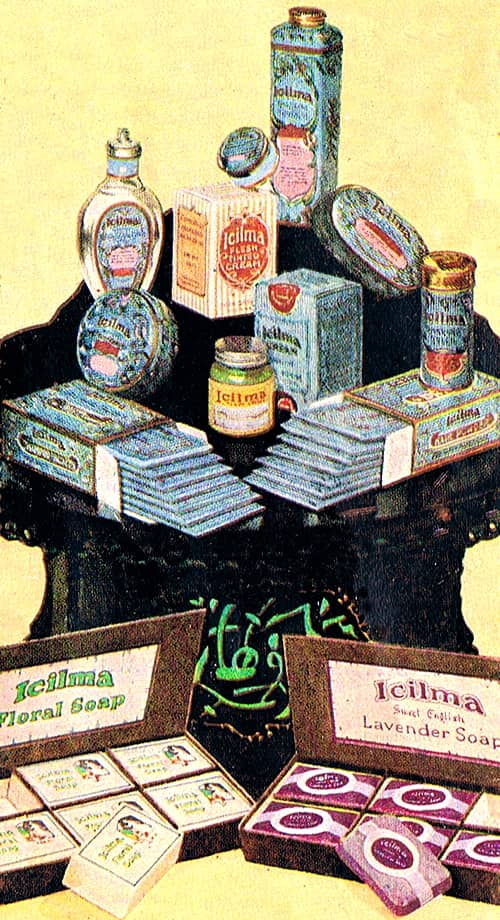
Above: c.1925 Assorted Icilma products. Note the green glass of the Icilma Fluor Cream. The original bottle was blue.
Also see the booklet: Preparations for the Toilet (c.1924)
Lever Brothers
The British soap market had become saturated by 1920 and Lever Brothers Ltd., a major British soap manufacturier, began buying other cosmetic and toiletry companies to continue its growth. Brands acquired by Lever Brothers around this time included D&W Gibbs (1919), Erasmic (1919), A&F Pears (1920), and Atkinson’s (1920). In 1922 Lever Brothers bought Icilma for £60,000 in cash and £155,000 in shares.
Lever Brothers continued the process of moving Icilma towards the cosmetic mainstream, a good example being Icilma (Fluor) Cream. By the early 1920s the cream was becoming increasingly threatened by skin-care systems such as the ‘Every skin needs two creams’ idea developed by the American Pond’s Extract Company in 1916, and by higher-priced skin creams sold by salon-based companies such as Elizabeth Arden and Helena Rubinstein. Pond’s Cold Cream and Vanishing Cream was a major threat and Icilma argued against Pond’s two-cream idea at first.
Myriads of women who use Icilma year and year out, have proved to their own satisfaction that there is nothing better for the skin and complexion than Icilma, no matter what it costs.
After all two creams are unnecessary in this country, where refined Englishwomen pin their faith to perfect skin cleanliness (good soap and water) and suitable toilet cream such as Icilma.
Icilma Cream is different and will more for your skin and complexion than expensive “Special Treatments.”(icilma advertisement, 1923)
See also: Pond’s Extract Company
However, within a few years Icilma had begun to capitulate. By 1928, it was advertising its Cold Cream as a cleanser and nourishing night cream and had largely rebranded its Icilma Cream as a vanishing cream for use as a skin protectant and powder base during the day.
Icilma Cream: “The unique and beautifying Natural Spring Water from Algeria makes Icilma Cream unrivalled as a skin tonic. The exclusive process by which it is manufactured ensures a delicacy and airy lightness never yet equalled. Icilma holds powder perfectly.”
Icilma Cold Cream: “The pure oils used in the manufacture of Icilma Cold Cream feed and nourish the fragile tissues of the skin and clear the pores of every trace of dust and grime. Massage with this most luxurious skin food every night prevents skin fatigue induced by the strain of modern life and keeps the skin in fresh, youthful loveliness.”
By the early 1930s this conversion was largely complete with Icilma adopting the Pond’s Extract Company’s two-cream system of a cold cream at night and a vanishing cream during the day.
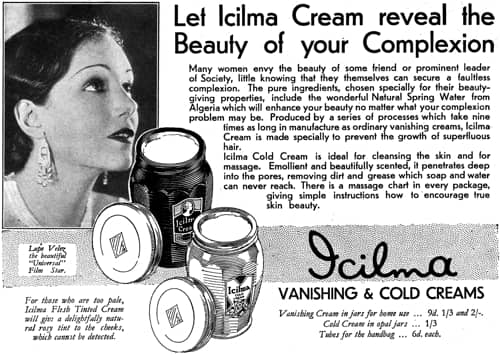
Above: 1931 Icilma Cold and Vanishing Cream.
Lever Brothers also updated the packaging of a number of Icilma products, added a Magnolia perfumed version of Icilma Face Powder and Icilma Cream – Icilma Cold Cream was perfumed with Moss Rose – introduced a compact form of the face powder, added a lipstick into the range, and shortened the company name from International Icilma Trading Company Ltd. to the Icilma Company Ltd.
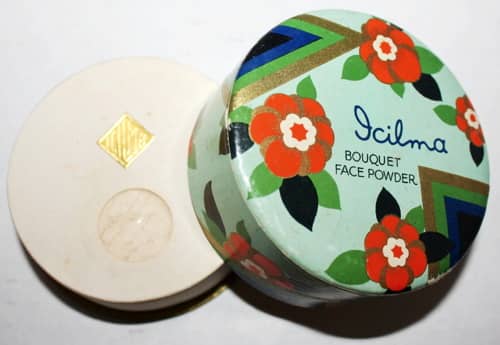
Above: Icilma Bouquet Face Powder in packaging introduced in the 1920s by Lever Brothers.
Icilma Poudre Compacte: “The delicate Solid Powder does not crumble in use, goes easily on to the puff, and adheres closely.” Shades: Naturelle, Creme, Rouge, and Rouge Brunette.
Icilma Lip Stick: “[W]ill keep the lips in splendid condition—soft and velvety and proof against all weather changes.” Shades: Standard, White, and Rouge.
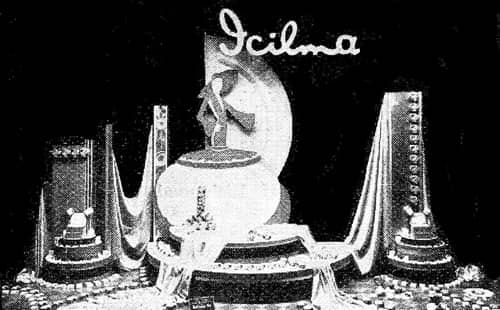
Above: 1931 Icilma window display.
Unilever
In 1929, Lever Brothers and the Dutch Margarine Union merged to form Unilever. Following the merger there was some reorganisation of the subsidiaries of Lever Brothers including Icilma. In 1938, when the lease on St. Pancras expired, manufacturing of Icilma products was moved to the A&F Pears factory in Isleworth. Icilma sales were then merged with A&F Pears in 1941 during a war-time rationalisation. All references to Icilma Water also stopped after 1940 as it would have been impossible to source water from Algeria during the Second World War.
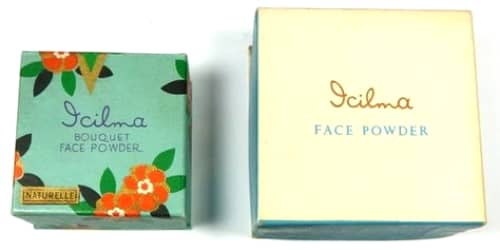
Above: Icilma Face Powder. The box on the right is wartime packaging.
I have found no changes in the Icilma cosmetic range during the 1930s apart from occasional packaging updates and a few increases in shade ranges. For example, Icilma Lipstick came in Ruby, Wine, Tango, Flame, and Cerise shades by 1934 and Icilma Face powder was available in Rachel, Brunette, Naturelle, Rosee, and Sun-Tan shades by 1937.
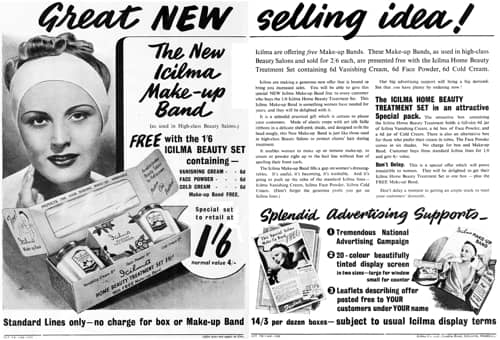
Above: 1939 Trade promotion for Icilma Beauty Set.
Poem
In 1945, Unilever’s main sales were in household soaps and foodstuffs. It had expanded its toothpaste business by buying Pepsodent in 1944 but its interest in cosmetics and toiletries was low which perhaps explains why Icilma was going into terminal decline. In 1950, Unilever attempted to resurrect Icilma by rebadging some of its lines as the Poem Aids to Beauty.
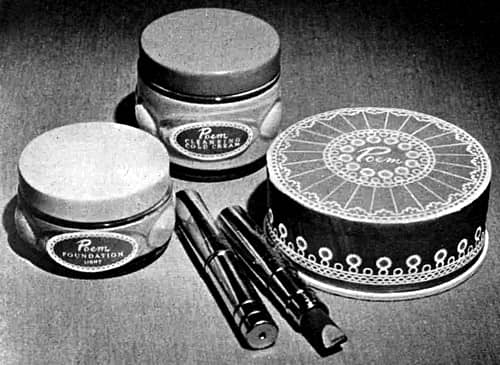
Above: 1950 Poem Face Powder, Tinted Foundation and Lipstick.
Poem Powder: “Stays smooth and lasting as a silken veil.” Shades: Naturelle, Pink Naturelle, Peach, Apricot, Suntan, and Rachel.
Poem Tinted Foundation: “New double-matt texture to hold powder closely, evenly, through the longest day. Keeps the skin rose-petal soft—no dry, cake-like feeling.” Shades: Light, Medium, and Dark.
Poem Lipstick Shades: “Gives lips a moist, eager beauty, keeps natural smoothness.” Shades: Deep Heather, Wild Rose, Double Pink, Cyclamen, Desert Flower, and Red Tulip.
Icilma also added a purse-sized version of the Tinted foundation in 1952.
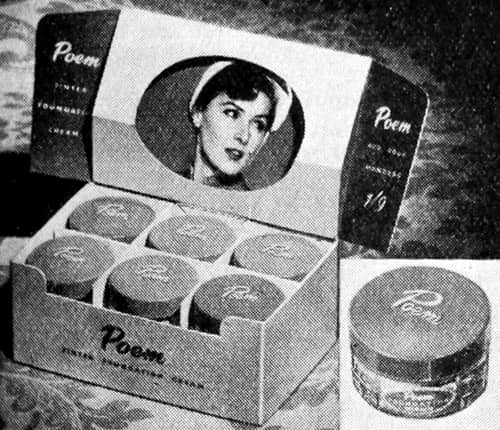
Above: 1952 Poem stand of purse-sized version of Tinted Foundation.
The Poem range was largely a repackaging exercise. It did not incorporate any of the new post-war trends in make-up and was only came in a limited shade range. It failed to get much attention from British consumers who now had access to a wide range of American cosmetics. It was discontinued in 1953 effectively ending Unilever’s interests in Icilma. However, it did not dampen Unilever’s desire to be in the cosmetics business and the company went on to buy Cheseborough-Pond’s in 1986.
See also: Chesebrough-Pond’s
Icilma hair-care products continued on but Unilever moved their sales agents from A&F Pears to its toiletries subsidiary, Pepsodent (Sales) Ltd., which handled toothpastes, shampoos, home permanents and hair dyes.
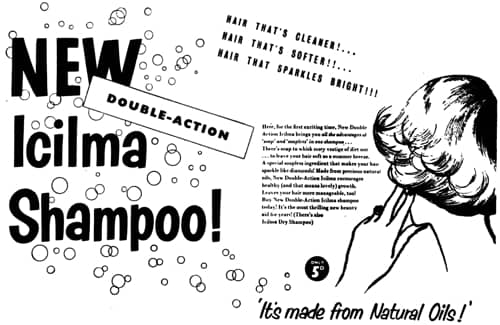
Above: 1954 Icilma Shampoo.
The only Icilma cosmetics that remained after 1953 were its Foundation Creams – Iclima Foundation Cream and Icilma Vanishing Cream.
Icilma Foundation Cream: “Foundation Cream is wonderful for making skins softer, silkier, brighter, and for holding powder through many extra hours.” Shades: Light, Medium, and Rose.
The products, which had their origins in Icilma Fluor Cream and Icilma Flesh-Tinted Cream, continued to be sold until 1967 when they were also discontinued, bringing the story of Icilma to a close.
Timeline
| 1899 | Maison Icilma established in Avenue de l’Opéra, Paris with a factory in Asnières-sur-Seine. |
| 1901 | Paris outlet closed. Icilma business moved to London. |
| 1904 | Icilma Company Ltd. founded. |
| 1907 | Company moves to larger premises in Rosebery Avenue, London. New Products: Shampoo Sachet; and Hair Powder. |
| 1908 | Icilma Company Ltd. established to acquire Icilma, Selama and Amel trademarks. |
| 1911 | Factory established in King’s Road, St. Pancras. |
| 1913 | New Products: Nail Powder Polish; and Flesh-Tinted Cream. |
| 1919 | International Icilma Trading Company Limited established. |
| 1920 | New Products: Icilma Bouquet Face Powder. |
| 1922 | Icilma bought by Lever Brothers. Icilma Company Ltd. wound up. |
| 1929 | International Icilma Trading Company Ltd. renamed Icilma Company Ltd. |
| 1930 | Lever Brothers becomes Unilever. |
| 1934 | New Products: Icilma Shampette. |
| 1938 | St. Pancras factory closed. Manufacturing moves to A&F Pears in Isleworth, Hounslow, London. |
| 1941 | Icilma products now sold through A&F Pears. |
| 1950 | New Products: Poem range. |
| 1953 | Icilma distribution moved from A&F Pears to Pepsodent (Sales) Ltd. Poem line discontinued. |
| 1967 | Icilma Foundation Creams withdrawn from sale. |
First Posted: 6th May 2019
Last Update: 12th August 2022
Sources
Hanriot, M. (1911). Les eaux minérales de l’Algérie. Paris: Gouvernement Général de l’Algérie.
International Icilma Trading company. (c.1924). Icilma: Preparations for the toilet [Booklet]. London: Author.
Jones, G. (2010). Beauty imagined: A history of the global beauty industry. Oxford: Oxford University Press.
Notes on preparations for the sick. (1903). Bristol Medico-Chirurgical Journal, 21, 281-283.
Thomas Cook & Son. (1908). Cook’s practical guide to Algeria and Tunisia. With maps, plans, and illustrations. London: Author.

Discovery of the artesian water source near Port-aux-Poules Station, Algeria. Carbon dioxide gas mixed with the water causes the water to rise above the ground to a height of 12 to 50 feet (up to 15 metres) above the ground. This image is from one of a series of three postcards printed for Icilma by the Willesden Fine Art Printing Company in 1909.
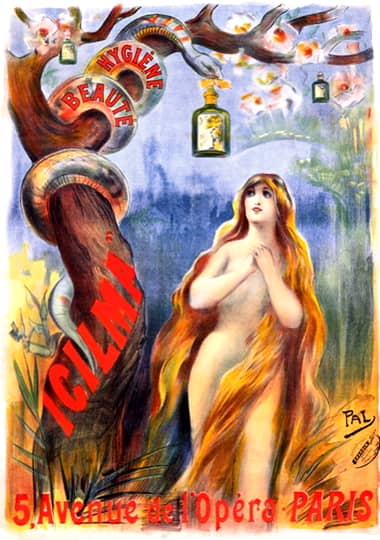
c.1899 Icilma Beauté Hygiène (France).
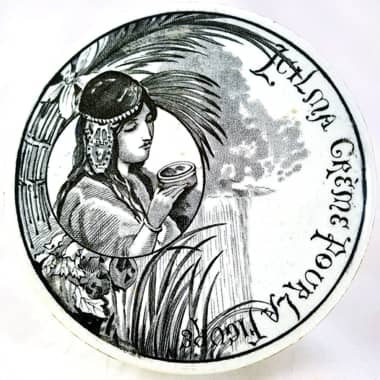
A lid from a pot of Icilma Crème pour la Figure.
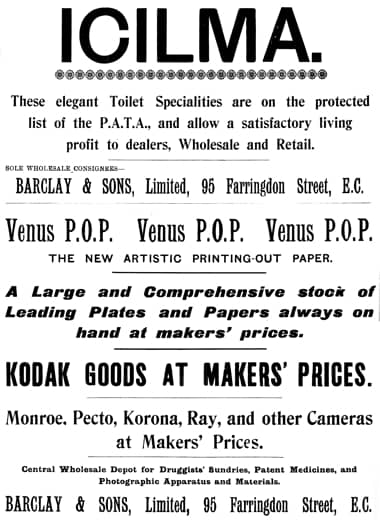
1900 Icilma’s British agents, Barclay & Sons.
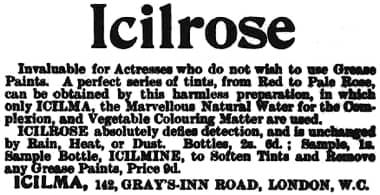
1901 Icilrose.
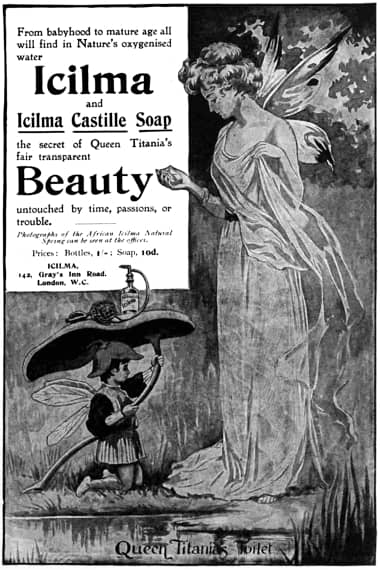
1902 Icilma Castille Soap. Note the spray bottle.
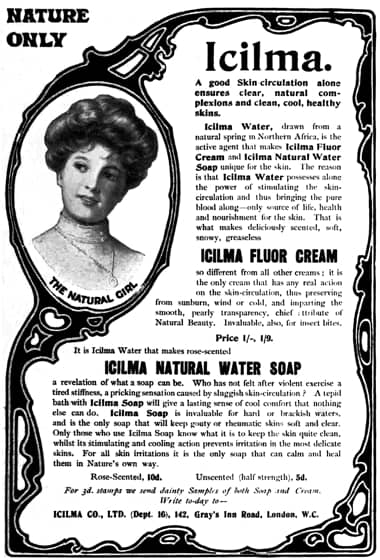
1907 Icilma Fluor Cream and Natural Water Soap.
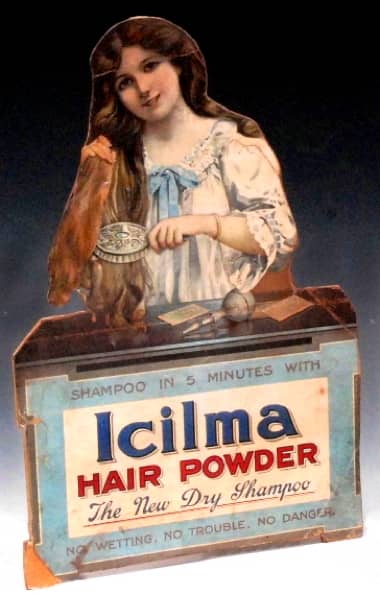
Display stand for Icilma Hair Powder.
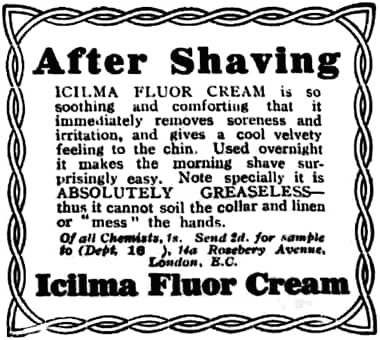
1909 Icilma Fluor Cream after shaving.
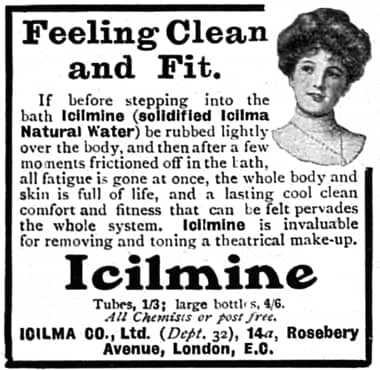
1909 Icilmine.
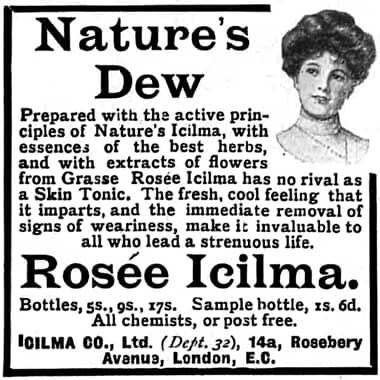
1909 Rosée Icilma.
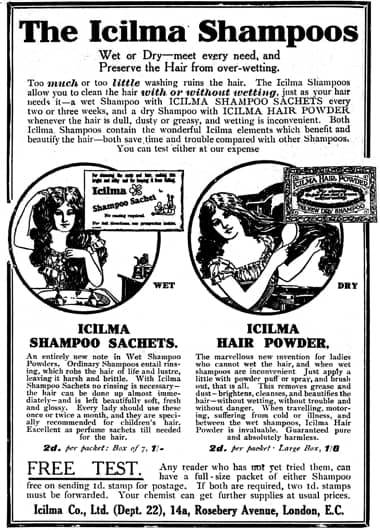
1911 Icilma Shampoos Sachets and Hair Powder.
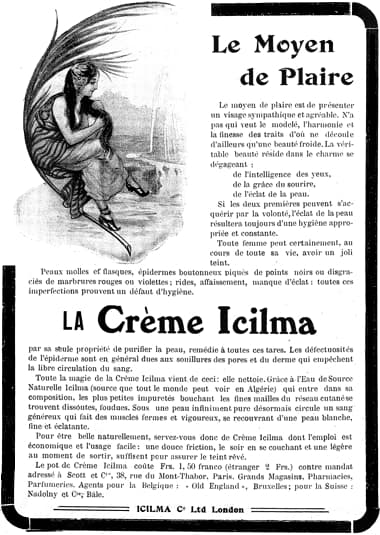
1912 Crème Icilma (France).
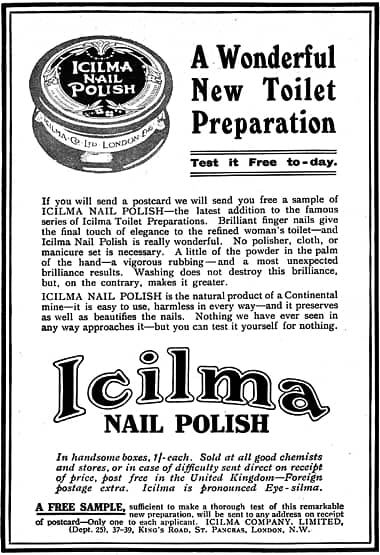
1913 Icilma Nail Polish.
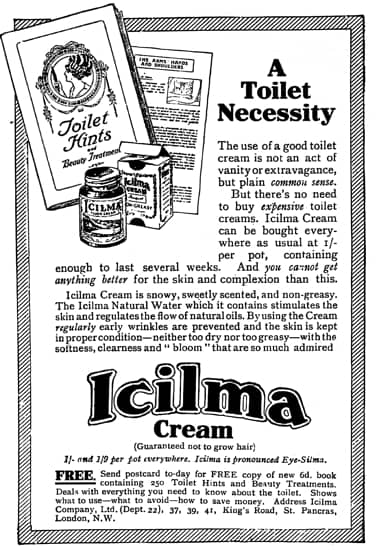
1916 Icilma Cream.
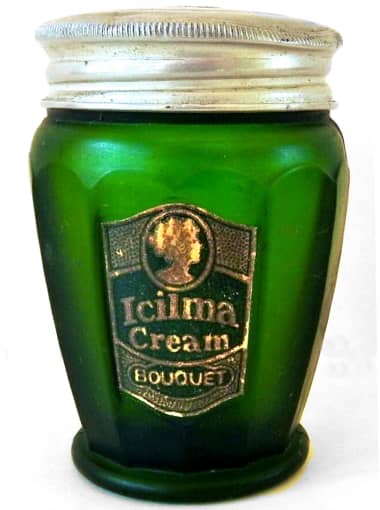
Icilma Cream. Lever brothers changed the original blue glass container to green before changing the shape of the bottle.
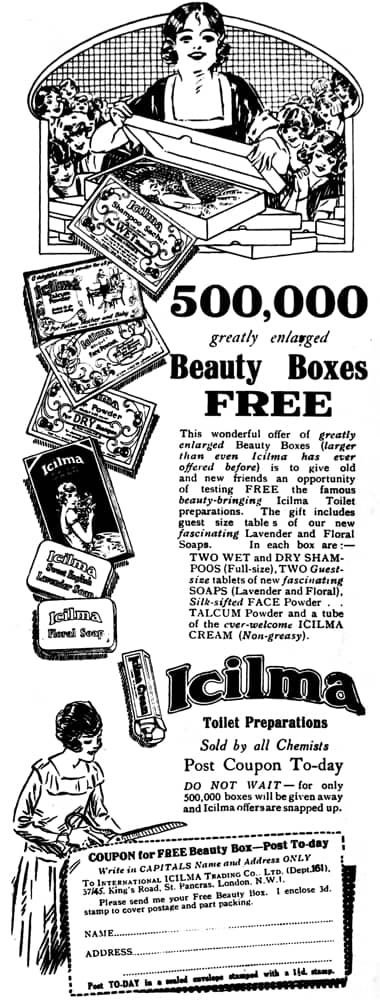
1924 Icilma Beauty boxes.
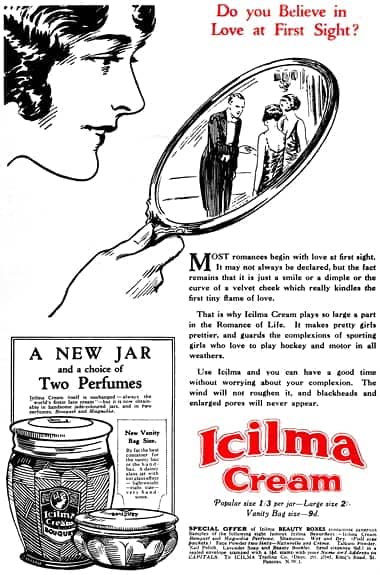
1925 Icilma Cream in a new jar.
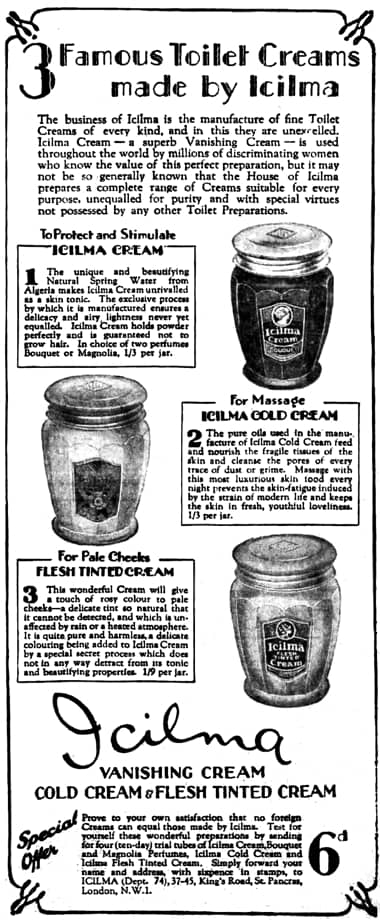
1928 Icilma Vanishing Cream, Cold Cream and Flesh-Tinted Cream.
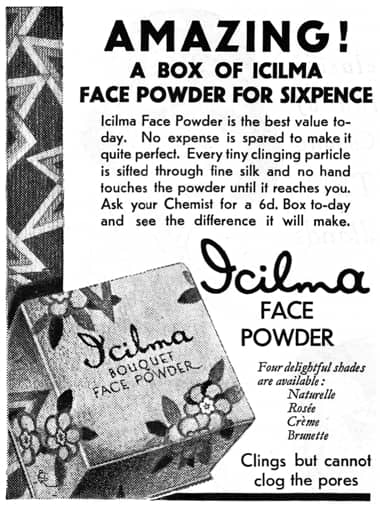
1931 Icilma Bouquet Face Powder.
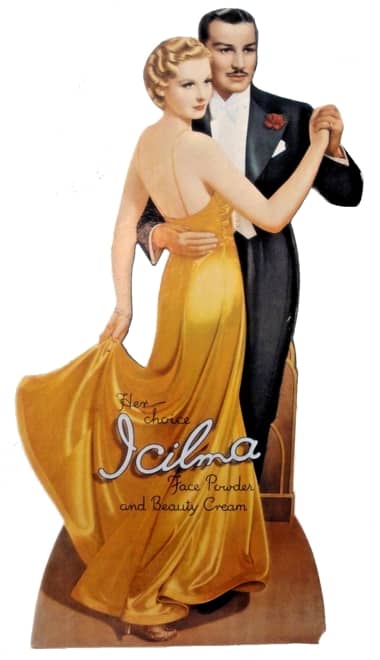
Display stand for Icilma Face Powder and Beauty Cream.
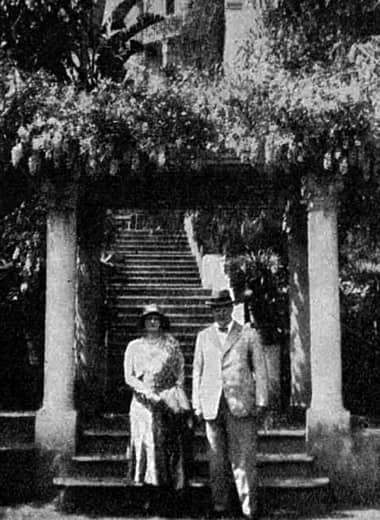
1933 Mr and Mrs Hartland-Swann on holidays in Algeria. In 1921, Louis Herbert Hartland Swann [1878-1947] changed his name by deed poll to Louis Herbert Hartland-Swann. He became a director of Lever Brothers and Unilever from 1928 to 1938.
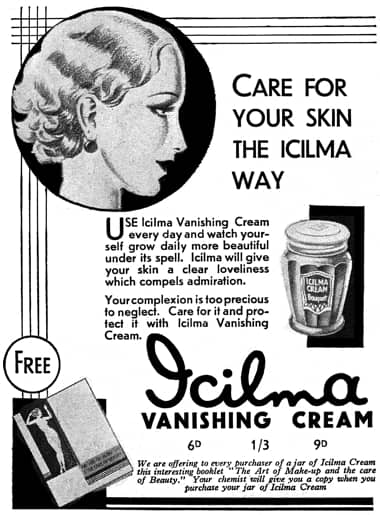
1933 Icilma Vanishing Cream.
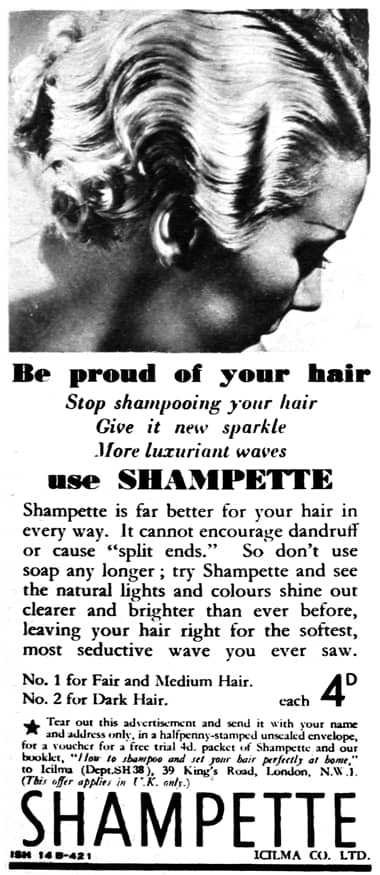
1936 Icilma Shampette.
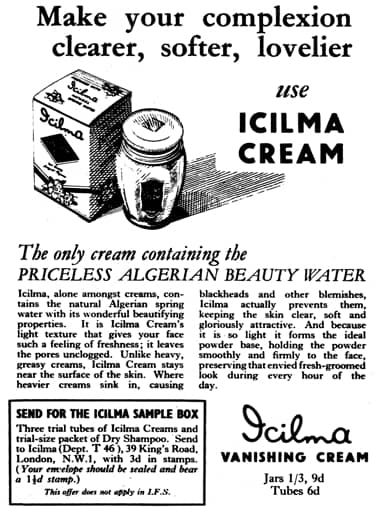
1937 Icilma Cream.
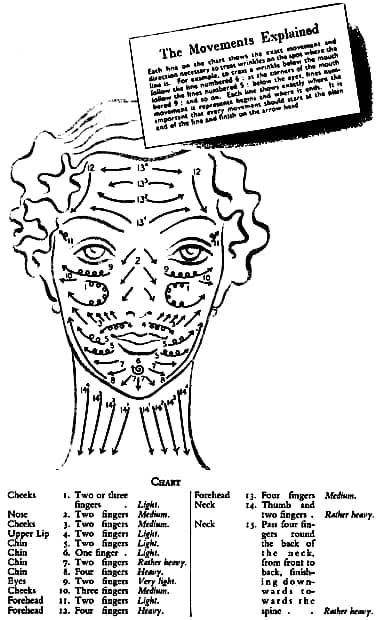
1944 Icilma chart of facial massage movements.
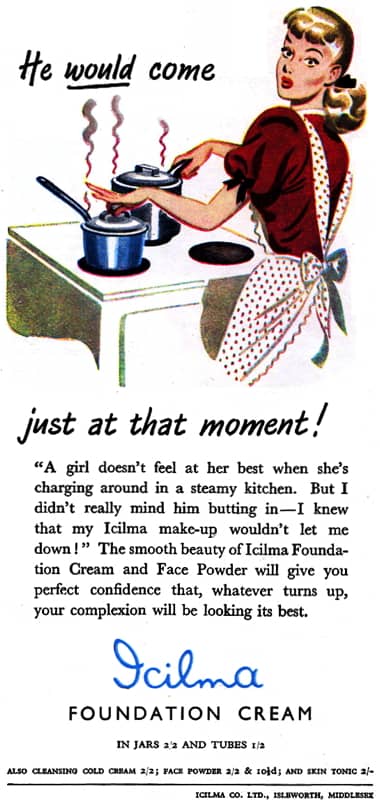
1947 Icilma Foundation Cream.
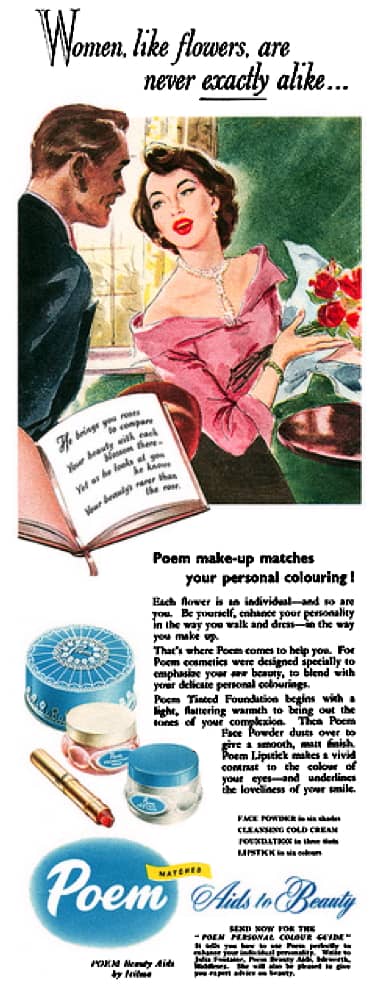
1951 Poem Face Powder, Tinted Foundation and Lipstick.
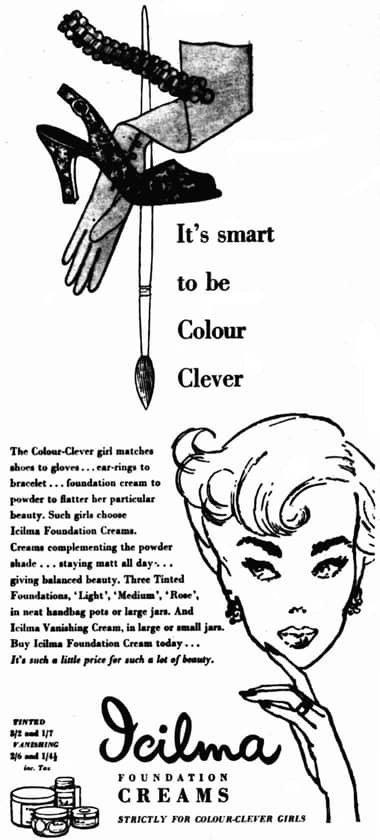
1954 Icilma Foundation Creams.
